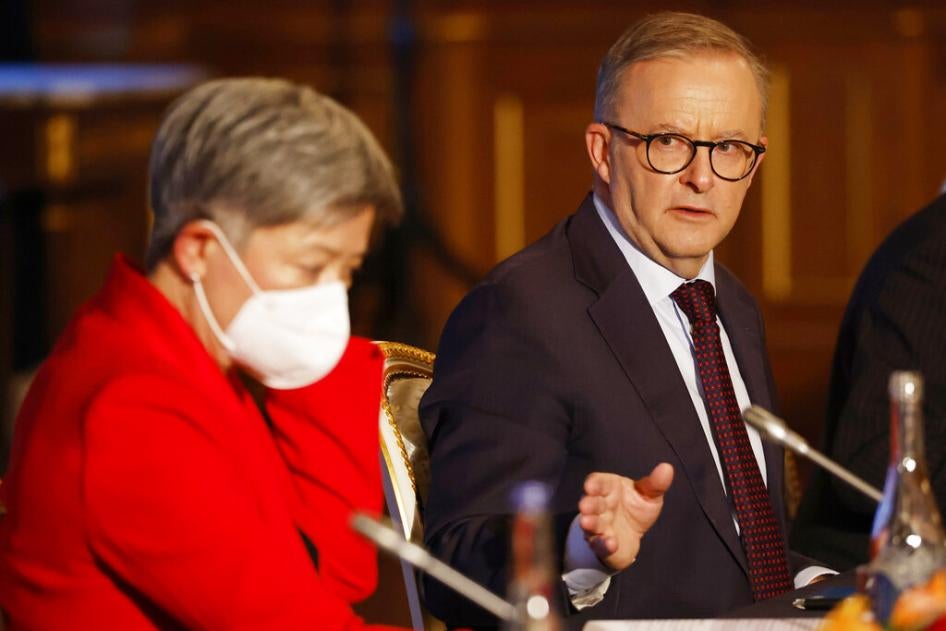(Sydney) – The Australian government should use the occasion of Human Rights Day on December 10, 2022, to announce new targeted sanctions against human rights abusers abroad, Human Rights Watch said today.
On December 8, 2021, the Australian parliament passed amendments to enable Magnitsky-style targeted sanctions for serious human rights abuses, violations of international humanitarian law, serious corruption, and activities undermining good governance and the rule of law. However, the Australian government has only used this new applied targeted sanctions regime once.
“One year has passed since Australia’s parliament passed Magnitsky-style sanctions, yet the government seems reluctant to use this tool to hold human rights abusers accountable,” said Elaine Pearson, Asia director at Human Rights Watch. “Australia’s democratic allies have imposed such sanctions to good effect around the world and Australia should too.”
The US Global Magnitsky Act was passed in 2016 in response to the death of a Russian accountant, Sergei Magnitsky, who in 2009, was tortured, denied medical attention, and found dead in his Moscow jail cell. Russian authorities had targeted him for his role in exposing a giant tax fraud scheme allegedly involving high-level government officials. The law allows the US administration to impose visa bans and targeted sanctions on individuals anywhere in the world responsible for committing human rights violations or acts of significant corruption.
The only time Australia has used the law was in March 2022, when then-Foreign Minister Marise Payne applied targeted sanctions against 39 Russians implicated in Magnitsky’s death and the serious corruption Magnitsky exposed.
By contrast, in the first year since the United Kingdom parliament passed its targeted sanctions regime in July 2020, more than 78 designations were made against individuals and entities from 11 situations of human rights violations in Africa, the Middle East, Asia, and Europe, according to an analysis by nongovernmental organization Redress.
The Australian government has sanctioned various Russian individuals and entities for their actions in Ukraine under the existing autonomous sanctions regime, but should avoid further delays to imposing sanctions on human rights abusers in other countries. It should examine individuals and entities already sanctioned by allies such as the UK, European Union, Canada, and the United States. And it should impose its own targeted sanctions, particularly on individuals and entities in the Asia-Pacific region, given there is a stronger likelihood that they have assets in Australia or might travel to Australia.
For instance, since the February 2021 coup in Myanmar, unlike Canada, the EU, UK, and US, Australia has not imposed any targeted sanctions on senior military leaders or entities in Myanmar responsible for human rights violations. A January 2022 joint letter to then-Foreign Minister Payne lists individuals and entities who have been sanctioned by other governments. The Australian government should act on this list as a starting point to harmonize its position on Myanmar with other concerned democracies.
The Australian government has also not imposed targeted sanctions on Chinese government officials who are responsible for crimes against humanity against Uyghurs and other Turkic peoples in Xinjiang. In a coordinated effort in March 2021, the EU, UK, US, and Canada imposed targeted sanctions, including travel bans and asset freezes, on senior officials in Xinjiang who have been implicated in serious human rights violations.
A groundbreaking United Nations report released on August 31, 2022, by the outgoing UN High Commissioner for Human Rights, Michelle Bachelet, contained victim accounts that substantiate mass arbitrary detention, torture, cultural persecution, forced labor, and other serious human rights violations in Xinjiang. It recommends that governments, businesses, and the international community should take action with a view to ending the abuses and advancing justice and accountability.
Following the release of the UN High Commissioner’s report, Australia’s political opposition, the Liberal-National Coalition, signalled that it would provide bipartisan support for any “appropriately targeted sanctions” that the government of Prime Minister Anthony Albanese applied in response to human rights abuses in Xinjiang. However, the Albanese government has not applied any such targeted sanctions on Chinese officials.
Australia should also join the EU, UK, and US, which have all recently imposed targeted sanctions against Iranian entities and individuals responsible for serious rights violations, including for the ongoing use of excessive and lethal force against anti-government protesters. These should include designating specific units of security forces or individuals in charge of leading the crackdown against protests and telecommunication officials behind the internet shutdown.
“Targeted sanctions should be coordinated to be effective,” Pearson said. “The Australian government should act without delay and join other like-minded democracies in holding serious human rights abusers to account.”







